The Best Career Path Is the One You End Up Going For
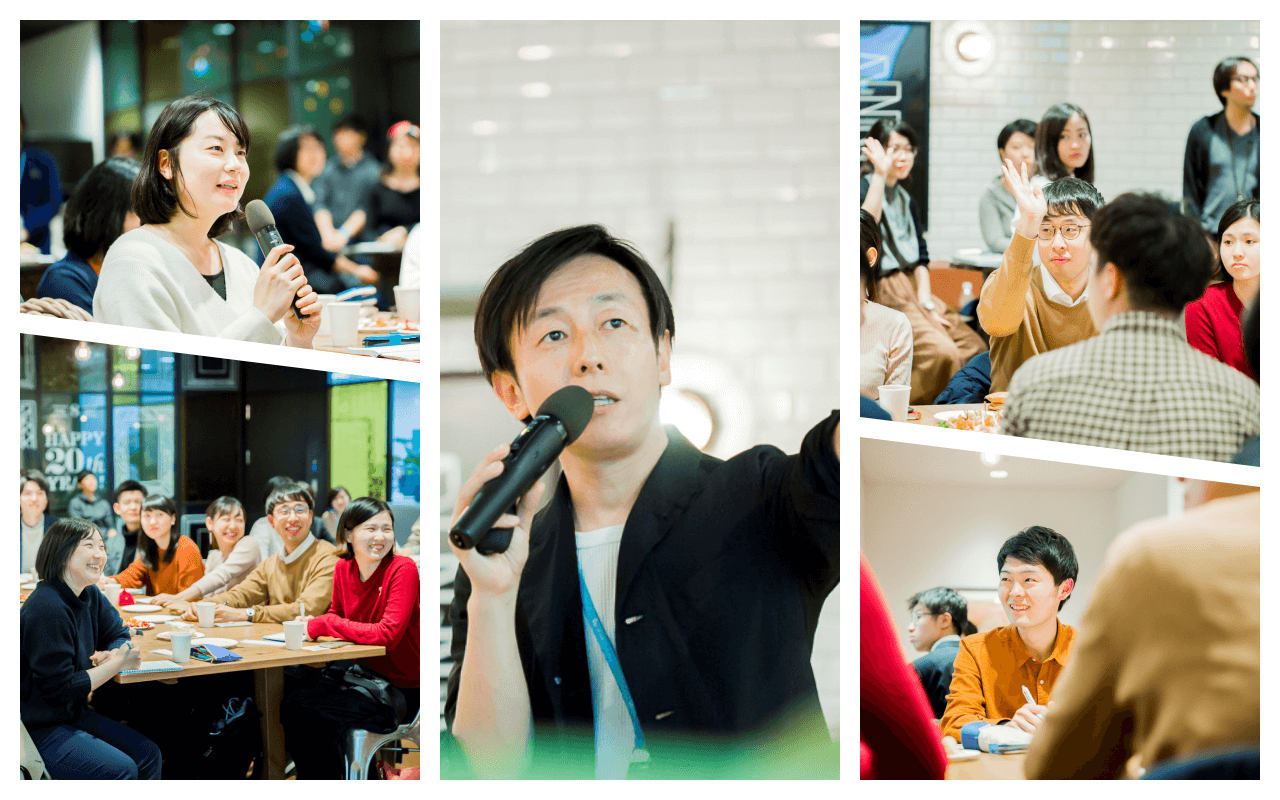
In an era where large companies are no longer necessarily a job hunter's safest bet, how do newcomers to the workforce go about finding a good company to work for? Is it actually possible for new graduates to tell if the company they're interested in is trustworthy?
Back in March of 2018, Cybozu CEO Yoshihisa Aono hosted a students-only meetup session at the company's headquarters in downtown Tokyo. The goal was to address concerns about finding a job and starting work. Here, we've selected some of the highlights of that discussion.
First, come up with a set of standards

What are the important things to keep in mind when choosing a company? And how do I know if a company is worth trusting?
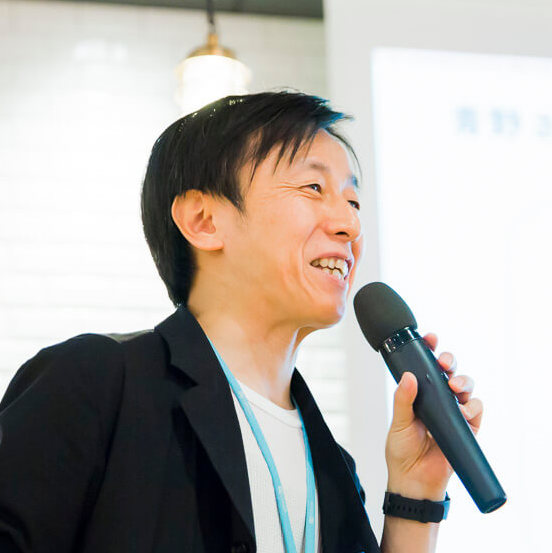
It's different for everyone. In fact, you have to keep in mind that the criteria by which you judge a company are bound to vary from person to person.
Just imitating others by thinking "My friend is using these standards, so I should too" won't ensure that you'll find a job that suits you. Quite the opposite, you'll probably end up losing sight of your own values. That's why the first thing you should do is come up with your own set of standards.
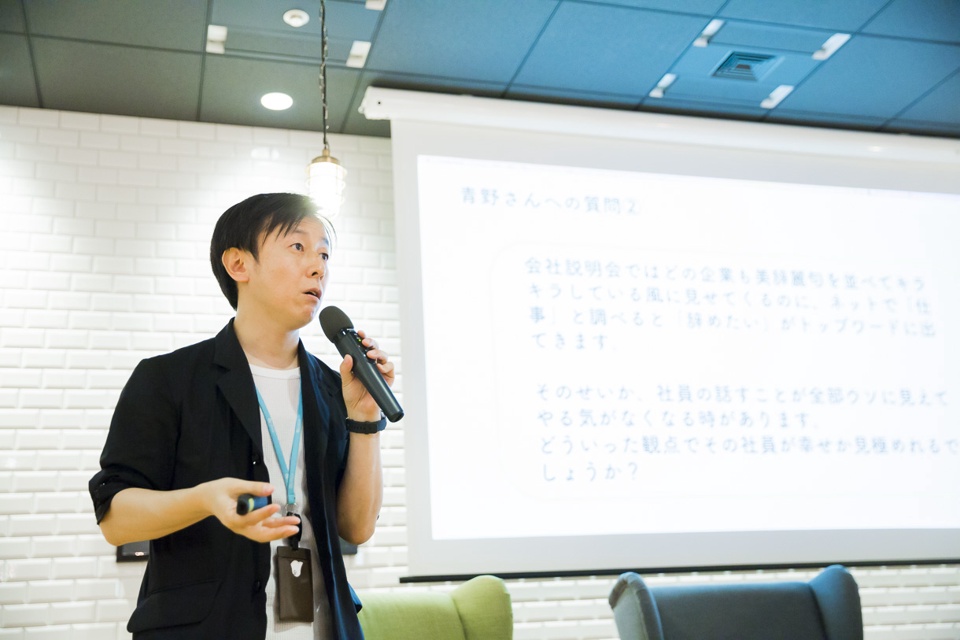
Yoshihisa Aono was born in 1971. After graduating from the Information Systems Engineering Division of the School of Engineering of Osaka University, he joined Matsushima Denkou (currently Panasonic). In August 1997 he co-founded Cybozu, and in April 2005 he was appointed CEO. Yoshihisa spearheaded the company's workstyle reform, as well as its transition toward cloud-based products in 2011. He is the author of several books on teamwork and happiness at work.

Here at Cybozu, we noticed students that don't have such standards tend to fail spectacularly. That's because a person who isn't able to have a clear view of what they want from their work isn't going to get anything out it.
If you think "I work because I want to get X," whatever that may be, then you can reach your targets and aspirations. Conversely, knowing if the work you're choosing can bring you where you want to go is just as important.

We've been receiving a lot of questions from Twitter in real time. A lot of people are wondering: How should we go about finding our own criteria for job hunting?

For a young person in their 20s, it's hard to have a clear answer. However, I'd encourage you to just give it a try and start by determining what you are good at doing.
For instance, there's a bestselling book by Tom Rath called Strengthsfinder 2.0. If you take the test in the book, it'll give you a better idea of your own strengths. Understanding how you are different from other people is a key component in determining who you are as a person.


On top of that, you can also look to which criteria you used in the past to make the decisions you now think were good.
However, bear in mind that people, including myself, are always changing based on new experiences. That's why understanding your own standards isn't just something you do when looking for your first job, but something you have to keep on revisiting throughout your life.
Trust in people, not companies


Here I'd just respond with: Are you really going to trust a company?
Let's say you trust my company; Cybozu isn't something tangible. In that sense, a company isn't something that really exists. If you're going to trust someone, let it be a manager, an employee—basically, a human.
This is a topic I've been wanting to talk about more, so I recently published a book. It's not yet available in English, but if you are interested, the Japanese version is available here.
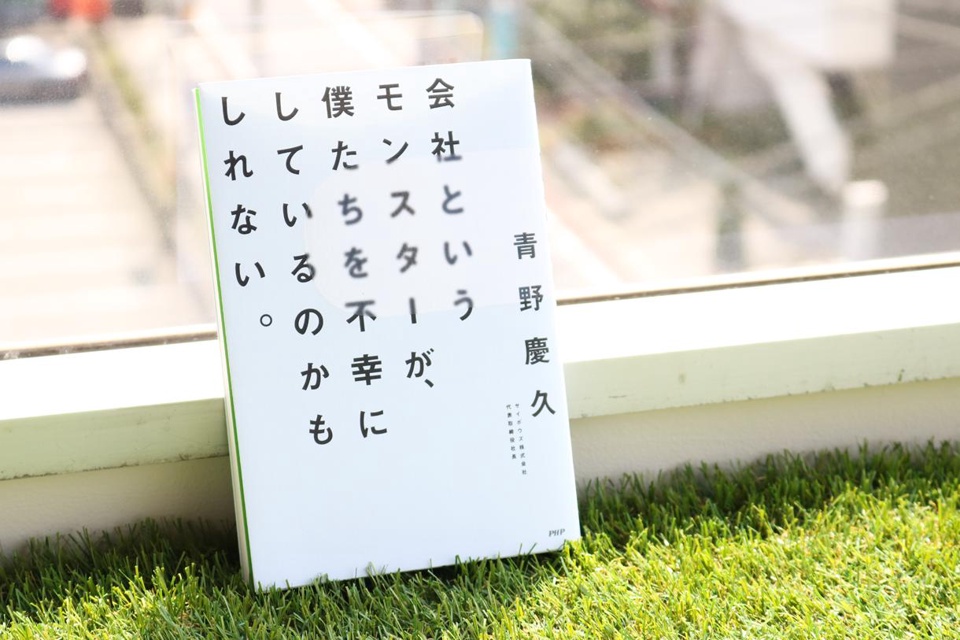
Match talent with mission


That's going to depend on the company. For example, companies seeking to expand overseas will be looking to build a workforce with strong international experience.
For Cybozu, it's extremely simple. There's no way I can have confidence in someone who isn't sure if they share our vision. If a person can't empathize with Cybozu's vision of "building a society brimming with teamwork," there's no way they'll enjoy our work environment.
Coming together as a team, building our organization—there's a motivation behind what we do. If we bring in people whose motivations don't align with ours, we'll just end up making each other miserable.
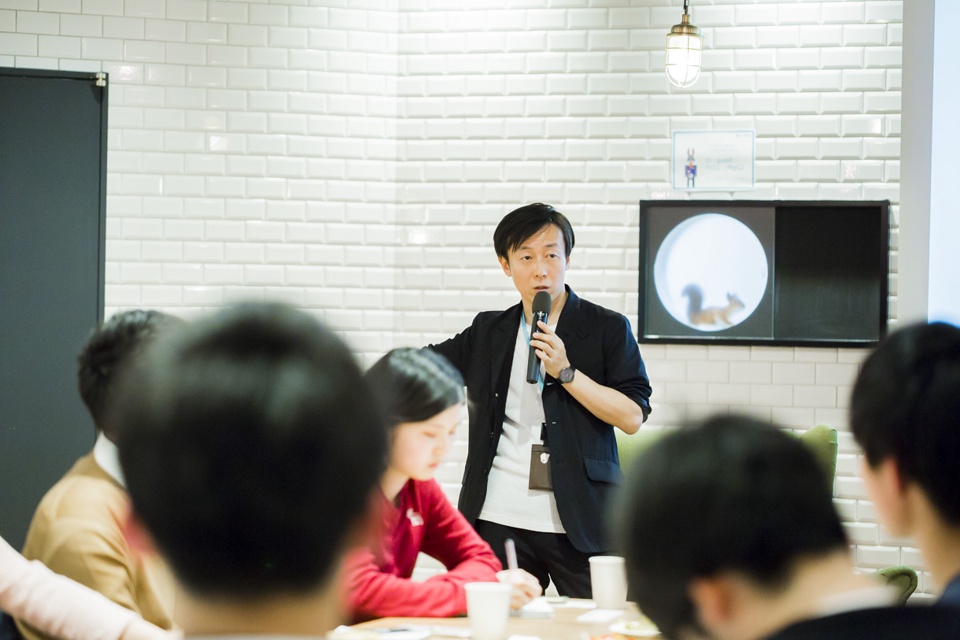
Choose your own right answer


If you focus on the conclusion, you'll only know whether a choice is right or not after you choose it. Since life only flows in one direction, there's no way to know beforehand if you should have joined company A instead of company B.
That's why you'll never really know if the choice you made was a good one. So the only way forward is to just go for it.
You may never objectively know if you made the right choice, but making a subjective decision can still lead to happiness.
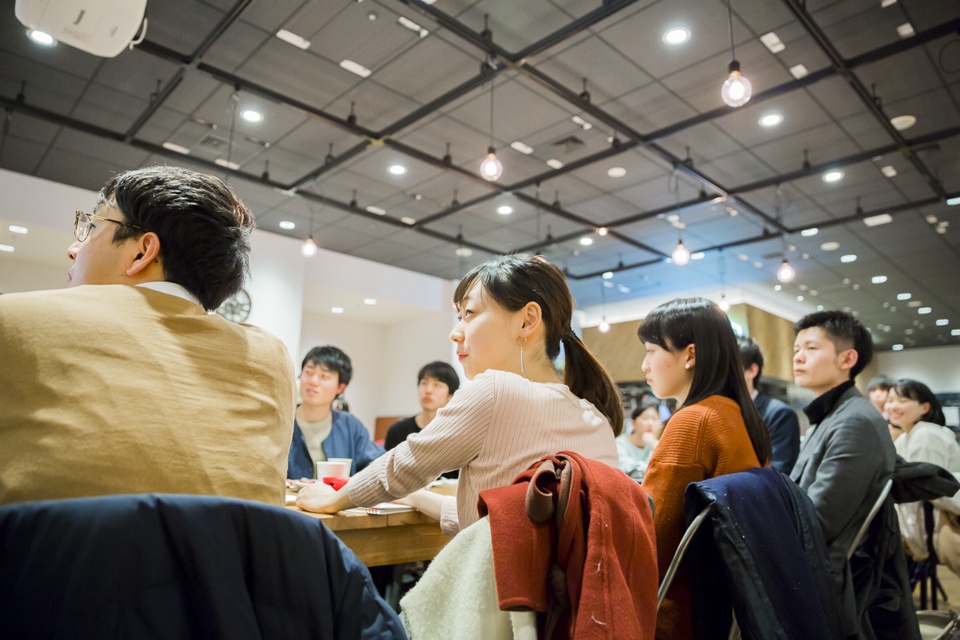

On the other hand, if you choose for yourself and are prepared to say "I'm taking full responsibility—if it turns out to be a mistake, I will change jobs," then you won't have any regrets, whatever you end up choosing. It was the same back when you were picking out a club to join in high school. You never really know if the choice you're making is the right one.
In the end, we're alone in this. Nobody else can just come in and teach us the right answer. Whether or not you feel ready, just go for it. That's actually a great way to enjoy life!

Is work really that tough?






Actually, I just graduated from high school. I'm a first-year university student. When I used to commute by train to my high school, on the way back, the train would be full of exhausted office workers falling asleep.
There would even be office workers sleeping in the priority seats, while elderly people were just standing there! Seeing that made me think "Wow, it's really that tough." How is it that these jobs are so exhausting that people would no longer be able to pay attention to their surroundings? That thought led me to ask my question.


I see. That's an unfortunate sight. Everyone around those sleeping workers just ends up feeling disgusted, don't they?
It's often said that Japanese society is synonymous with overwork, but how tired people get really depends. We should try as much as possible to manage ourselves in accordance with our own limits.
That being said, in Japan, a lot of companies have a "membership" type employment contract, where if your company tells you to change positions or transfer somewhere, you have no right to refuse.


I'd really like for this employment system to be updated, but unfortunately no such measure is currently up for debate before the national legislature.
I think it will become necessary to have a legislative change that will allow for the ability to choose one's own workplace, as well as the right to refuse transfers.
How you know if an executive is "awesome"?


You have to begin by deciding on a definition of "awesome." For example, for me, an important criterion is willpower. What is motivating that person to do what they are doing?
Also, you'll find that among managers in big companies, surprisingly few are actually "awesome." Even pretentious ones who publish books with titles like "Workplace Revolution!" don't actually have the willpower to change their seniority-based work system, preferring instead to just tweak their business model a little bit.
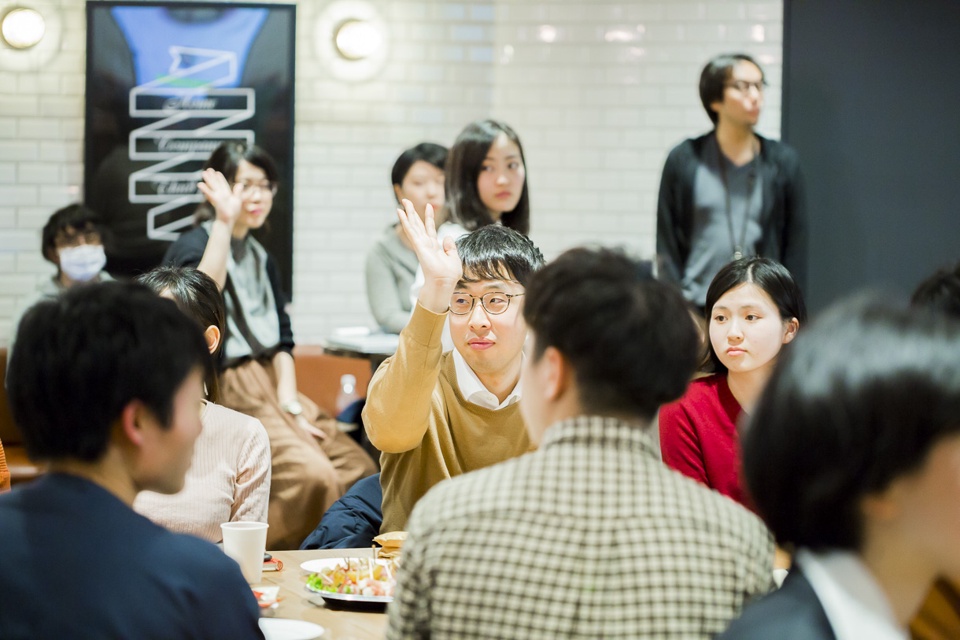


One way to check if they walk the walk—in other words, if what they do matches what they say—is to take a look at the statements they're making via their company's advertising, social media, etc.
If they're representing their company but not proactively putting out statements, that's a shame, especially since they're in a position where they're being listened to. If they're not communicating about what's going on in their company, it becomes difficult to tell if they truly believe in what they preach.
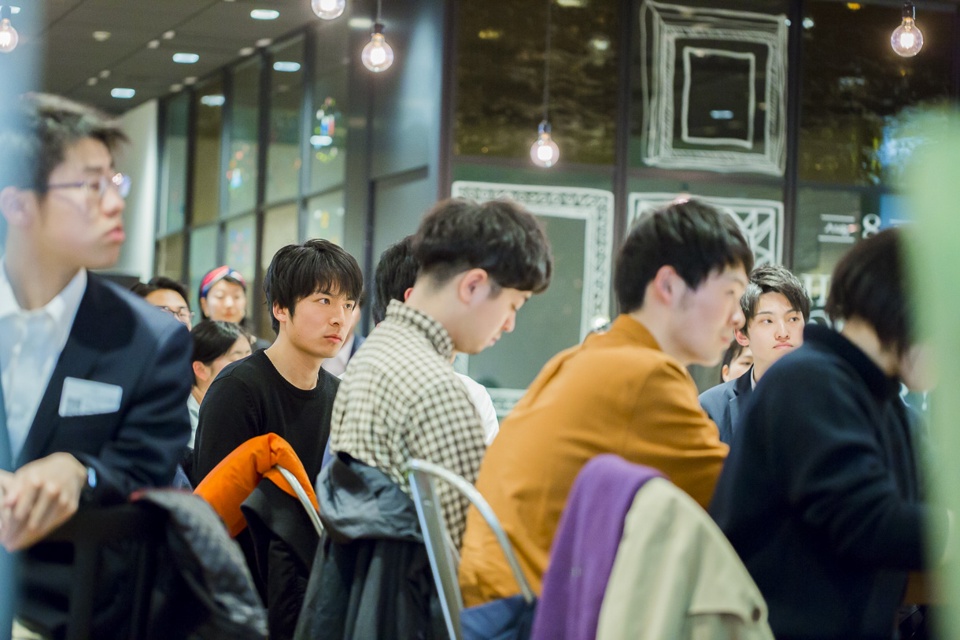
Dreams can change, and that's OK

I admire people who, even as adults, continue to chase after their dreams. I feel like it must be hard.
Mr. Aono, you seem like someone who would devote yourself entirely into the things you want to do. What do you think people should do to be able to keep chasing their dreams, even as adults?

That's a profound question. As it turns out, many of my own dreams have been shattered. Case in point, at first, I really wanted to work as a programmer. I've liked computers ever since I was a kid, so as an adult I pursued a technical path as far as my comprehension would let me. But I didn't have the talent. Back in university, when I first met Shinya Hata, a future co-founder of Cybozu, I immediately thought, "I'm never going to be as good as this guy."
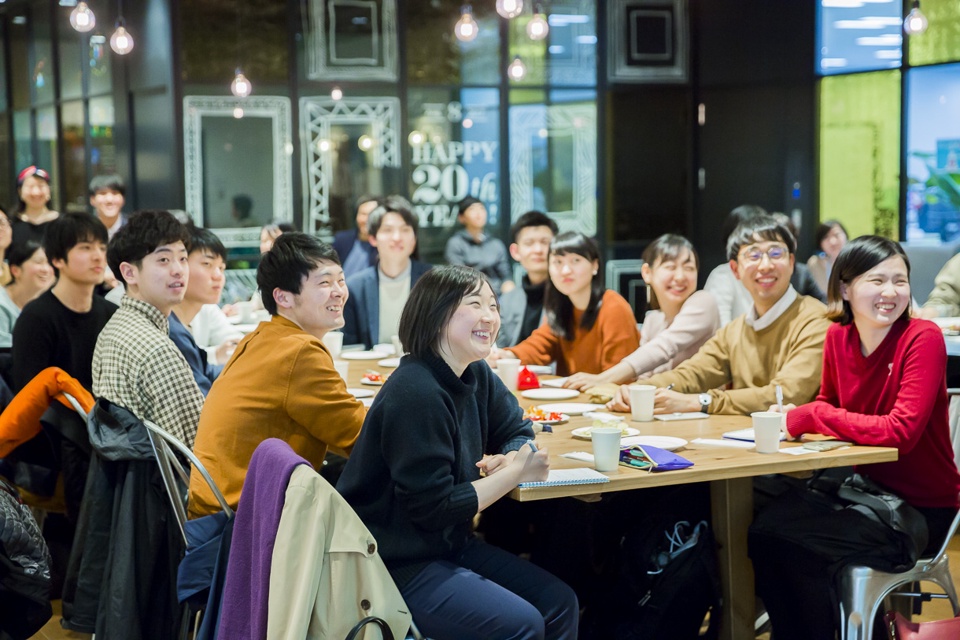

Even after that, when I was looking for a job, I wanted to work in research, but that didn't end up happening either. When I founded Cybozu, I immediately wanted us to become the next Google or Microsoft, which also didn't go as planned. But now, it feels like we are crawling forward, one step at a time.
Based on my experience, one thing I can say is that dreams change depending on the situation we're in. There will probably come a time where you're going to have to give up. And when that time comes, you have to know how to be flexible. In other words, you have to have the ability to hit the reset button, change course and devote yourself to your next dream.
If you're able to do that, you'll be able to keep pursuing your dreams, even as an adult. Dreams are something that are OK to change.
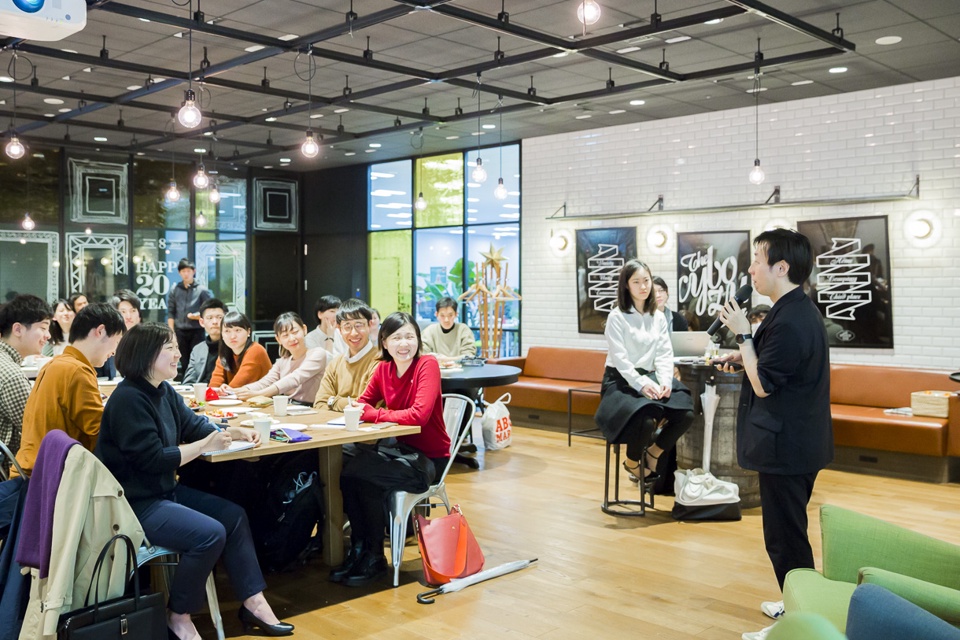
Parting thoughts


When it comes to finding a job, people will tell you all kinds of things. You can go ahead and ignore most of them! Twentieth century thinking isn't going to stay mainstream forever. What you do with your life is something you must decide for yourself.
It's fine to go and listen to what other people have to say, but ultimately the answers can only be found within ourselves. And while we're at it, let's also choose to enjoy our lives a bit more.
Translated from Japanese and edited by Alex Steullet. Further editing by Richard Ho. Original Japanese article written by Nana Sonoda and edited by Nanae Matsuo (Note).Photography by Makoto Tochikubo. The original Japanese article is available at the link below.
Writer

Alex Steullet
Alex is the editor in chief of Kintopia and part of the corporate branding department at Cybozu. He holds an LLM in Human Rights Law from the University of Nottingham and previously worked for the Swiss government.


